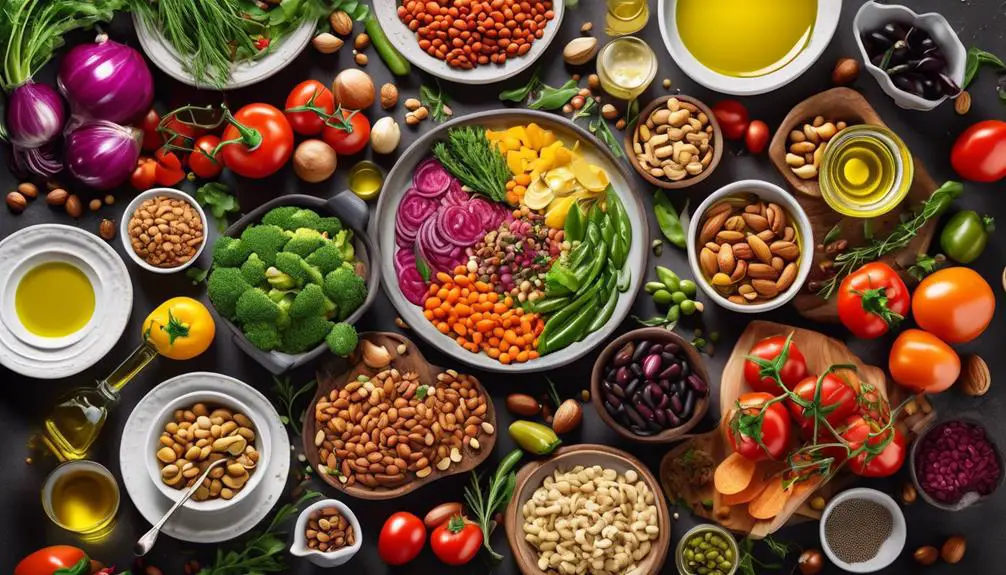Imagine yourself embarking on a culinary journey, where vibrant flavors dance on your taste buds and nourish your body from the inside out. The Mediterranean diet offers a bountiful feast of health benefits, and as a vegetarian, you might wonder how to embrace this lifestyle.
Fear not, for we have gathered the eight best ways to adopt the Mediterranean diet for vegetarians.
From savoring the golden richness of extra virgin olive oil to tantalizing your senses with a colorful array of fruits, vegetables, grains, and legumes, these tips will guide you towards a healthier and more vibrant way of eating.
So, come and discover the secrets of this nourishing diet, and unlock a world of culinary delights that will leave you craving for more.
Key Takeaways
- Cooking with extra virgin olive oil enhances the flavor of vegetarian Mediterranean dishes and provides health benefits such as lower bad cholesterol levels and protection against chronic diseases.
- Incorporating a variety of plant-based foods, including fruits, vegetables, whole grains, and legumes, provides essential nutrients, fiber, and antioxidants.
- Embracing minimally processed, fresh, and local foods supports local farmers, reduces the carbon footprint, and allows for the enjoyment of true flavors and nutritional benefits.
- Including dairy products and eggs in moderation, or opting for plant-based alternatives, helps maintain balance and variety in the Mediterranean diet while still following a vegetarian lifestyle.
Use Extra Virgin Olive Oil as Cooking Fat
When it comes to cooking on a vegetarian Mediterranean diet, make extra virgin olive oil your go-to cooking fat for a healthier and more flavorful experience. Extra virgin olive oil is a staple in the Mediterranean diet and offers numerous health benefits. Unlike butter, lard, and vegetable oils, extra virgin olive oil is rich in monounsaturated fats, which can help lower bad cholesterol levels and reduce the risk of heart disease. It’s also packed with antioxidants, such as polyphenols, which have anti-inflammatory properties and can protect against chronic diseases like cancer.
Incorporating extra virgin olive oil into your daily cooking routine is a simple and effective way to enhance the flavor of your vegetarian Mediterranean dishes. Its distinct fruity and grassy notes add depth and complexity to any recipe. Whether you’re sautéing vegetables, drizzling it over a salad, or using it as a base for marinades and dressings, extra virgin olive oil brings a delightful Mediterranean taste to your meals.
To make the most of its flavor, it’s recommended to pair extra virgin olive oil with herbs commonly used in Mediterranean cuisine, such as basil, oregano, and thyme. These herbs complement the oil’s natural flavors and create a harmonious blend of tastes. Additionally, using extra virgin olive oil in your cooking can help you absorb more fat-soluble vitamins from vegetables, making your meals even more nutritious.
Incorporate Variety of Fruits, Vegetables, Grains, and Legumes
To ensure a diverse range of nutrients in your vegetarian Mediterranean diet, incorporate a variety of colorful fruits, vegetables, grains, and legumes into your daily meals. The Mediterranean diet emphasizes the consumption of plant-based foods, which offer a wide range of health benefits. As a vegetarian or vegan, you have numerous options to experiment with and increase your intake of legumes and plant-based proteins.
Incorporating fruits and vegetables is key to a successful vegetarian Mediterranean diet. Aim to include a colorful array of produce in your meals, such as leafy greens, tomatoes, bell peppers, eggplants, and citrus fruits. These foods are packed with vitamins, minerals, and antioxidants that support overall health and well-being.
Whole grains, such as brown rice, quinoa, and whole wheat bread, are important sources of fiber and nutrients. They provide sustained energy and help maintain stable blood sugar levels. Additionally, legumes like chickpeas, lentils, and beans are excellent sources of plant-based proteins and fiber. They can be added to salads, soups, or stews to enhance both flavor and nutrition.
To add depth and flavor to your meals, incorporate herbs and spices like basil, oregano, garlic, and turmeric. These culinary additions not only enhance the taste of your dishes but also offer additional health benefits.
Embrace Minimally Processed, Fresh, Local Foods
Incorporating minimally processed, fresh, and locally sourced foods is essential when embracing the Mediterranean diet. This way of eating emphasizes a plant-based diet, with an abundance of fruits, vegetables, whole grains, legumes, and healthy fats. Here are four reasons why you should embrace these types of foods:
- Take advantage of in-season produce: By choosing fruits and vegetables that are in season, you not only support local farmers but also ensure that you’re getting the freshest and most nutritious ingredients. In-season produce tends to be richer in flavor and packed with vitamins and minerals.
- Choose fresh, locally sourced ingredients: Opting for fresh, locally sourced ingredients not only supports your local economy but also reduces the carbon footprint associated with transporting food long distances. It also ensures that you’re getting the highest quality ingredients for your meals.
- Minimize intake of processed foods: The Mediterranean diet discourages the consumption of processed foods, which are often high in unhealthy fats, added sugars, and preservatives. By focusing on whole foods in their natural state, you can enjoy the true flavors and nutritional benefits of the ingredients.
- Prioritize whole foods and ingredients: Whole foods, such as fruits, vegetables, whole grains, and legumes, form the foundation of the Mediterranean diet. These foods are packed with fiber, vitamins, minerals, and antioxidants, which support overall health and wellbeing.
Include Dairy Products and Eggs in Moderation
To maintain balance and variety in your Mediterranean diet, it’s important to include dairy products and eggs in moderation. Dairy products such as yogurt and cheese can be enjoyed as part of your meals, but it’s crucial to be mindful of portion sizes and frequency. Incorporating eggs into your diet as a versatile protein source is also recommended, but again, moderation is key.
When including dairy products and eggs in your vegetarian Mediterranean diet, it’s essential to consider plant-based alternatives as well. This allows for variety and balance in your meals. For example, you can explore plant-based yogurt made from almond or soy milk, or try vegan cheese options. These alternatives provide similar textures and flavors while still fitting within the Mediterranean diet framework.
Finding creative ways to incorporate dairy products and eggs into your meals can also enhance your vegetarian Mediterranean diet experience. You can add yogurt to smoothies, use cheese as a topping for salads or whole-grain pasta dishes, or include eggs in omelets or vegetable stir-fries. By using these ingredients in moderation and in combination with other nutrient-rich foods, you can enjoy the benefits of the Mediterranean diet while maintaining a vegetarian lifestyle.
Reduce Salt Intake and Opt for Herbs and Spices
Reducing your salt intake and opting for herbs and spices is a simple yet effective way to enhance the flavor of your meals while promoting better cardiovascular health. The Mediterranean Diet, known for its heart-healthy benefits, emphasizes the use of herbs and spices to add depth and complexity to dishes. Here’s why you should consider reducing your salt intake and incorporating more herbs and spices into your meals:
- Improve cardiovascular health: High salt intake has been linked to an increased risk of heart disease and hypertension. By cutting down on salt and using herbs and spices instead, you can lower your levels of sodium and reduce the risk of cardiovascular disease.
- Enhance flavors without relying on salt: Herbs and spices offer a wide range of flavors that can elevate your dishes without the need for excessive salt. Experiment with different combinations such as rosemary and thyme or cumin and coriander to create new and exciting tastes.
- Lower saturated fat intake: Reducing salt often means cutting back on processed foods, which are typically high in saturated fat. By opting for fresh herbs and spices instead, you can make healthier choices and reduce your intake of unhealthy fats.
- Boost nutritional value: Herbs and spices aren’t only flavorful but also packed with beneficial nutrients. For example, adding nuts and seeds like almonds and flaxseeds to your meals can provide essential omega-3 fatty acids and fiber, further supporting your cardiovascular health.
Limit Consumption of Red Meats, Especially Fatty Cuts
If you’re looking to improve your diet and promote better health, it’s important to limit your consumption of red meats, especially fatty cuts. Red meats, particularly fatty cuts, are high in saturated fats which can increase the risk of heart disease. The Mediterranean Diet, also known as the Med Diet, has been associated with a wide range of health benefits, including a reduced risk of cardiovascular disease.
To replace red meat as a protein source in your diet, opt for leaner options such as beans, lentils, and chickpeas. These plant-based alternatives aren’t only low in saturated fats but also rich in fiber and essential nutrients. Additionally, you can explore plant-based protein sources like tofu, tempeh, and seitan. These alternatives provide a similar texture and can be used in various dishes to replace red meat.
Incorporating nuts and seeds, such as walnuts and flaxseeds, is another great way to obtain healthy fats and add flavor to your meals. They can be sprinkled on salads or used in cooking as a substitute for red meat.
Swap Desserts for Fresh or Dried Fruits
Fresh or dried fruits can be a delicious and healthier alternative to traditional desserts. By swapping your usual sweet treats for fruits, you can satisfy your cravings while still following the principles of the Mediterranean Diet. Here are four reasons why you should incorporate fresh or dried fruits into your diet:
- Variety and Seasonality: Experiment with a wide range of local seasonal fruits. From juicy melons to succulent peaches, there are countless options to explore. This allows you to enjoy different flavors and textures throughout the year.
- Natural Sweetness: Fruits like dates, persimmons, and figs offer a natural sweetness that can rival any dessert. Indulging in these fruits allows you to satisfy your sweet tooth without consuming excessive added sugars.
- Align with the Mediterranean Diet: The Mediterranean Diet emphasizes whole foods, and fruits are a crucial component. By choosing fruit-based desserts, you can align your eating habits with the principles of this healthy eating pattern.
- Health Benefits: Fresh and dried fruits are packed with essential nutrients, including vitamins, minerals, and antioxidants. Additionally, they’re a great source of dietary fiber and provide a moderate amount of protein. Incorporating these fruits into your diet can contribute to maintaining a healthy weight and overall well-being.
Avoid Fast Food and Opt for Healthy Snacks
To make healthier snack choices, incorporate whole-food options such as mixed nuts, unsweetened yogurt with frozen berries, or oatmeal with dried fruit, instead of opting for fast food.
The Mediterranean diet, which is known for its health benefits, emphasizes the consumption of fruits, vegetables, whole grains, legumes, and nuts. As a vegetarian, it’s important to avoid fast food, which tends to be high in unhealthy fats, processed ingredients, and excessive sodium.
Instead, choose wholesome snacks that align with the principles of the Mediterranean diet. Enjoy fruits like apples with nut butter or unsweetened yogurt with frozen berries as a healthier alternative to fast food snacks. These options provide essential nutrients, fiber, and antioxidants, while also satisfying your cravings.
Additionally, prioritize whole foods in your snack choices. For example, you can add spinach to your eggs or include avocado and cucumber in your sandwiches. These additions not only enhance the nutritional value of your snacks but also contribute to a more satisfying and well-rounded meal.
Frequently Asked Questions
Can You Do the Mediterranean Diet as a Vegetarian?
Yes, you can definitely follow the Mediterranean diet as a vegetarian. Focus on incorporating extra virgin olive oil, fruits, vegetables, grains, legumes, dairy products in moderation, and experiment with herbs and spices for flavor.
How Do I Adopt a Mediterranean Diet?
To adopt a Mediterranean diet, start by incorporating extra virgin olive oil into your cooking. Base your meals on fruits, veggies, grains, and legumes, and choose vegetarian options for more plant-based protein. Use fresh, local ingredients and limit processed foods. Enjoy dairy, eggs, and herbs/spices. Reduce salt intake.
Are Eggs OK on Mediterranean Diet?
Yes, eggs are OK on the Mediterranean diet. They provide protein and essential nutrients. Incorporate them into your diet with other plant-based proteins. Enjoy eggs as a versatile and nutritious option, but remember to use them in moderation.
How Do I Transition to a Mediterranean Diet?
To transition to a Mediterranean diet, start by incorporating extra virgin olive oil as your primary cooking fat. Make fruits, vegetables, grains, and legumes the foundation of your meals, and prioritize fresh, whole foods over processed options. Experiment with herbs and spices to enhance flavor.
To Wrap it Up
In conclusion, by adopting the Mediterranean diet as a vegetarian, you can enjoy numerous health benefits and delicious flavors.
Use extra virgin olive oil as your primary cooking fat, incorporate a variety of fruits, vegetables, grains, and legumes, and embrace fresh, locally sourced ingredients.
Moderate your intake of dairy products and eggs, limit salt and opt for herbs and spices, reduce consumption of fatty red meats, and choose fresh or dried fruits as desserts.
Avoid fast food and opt for healthy snacks.
Start your journey to a healthier lifestyle today! For more healthy tip check our section,




